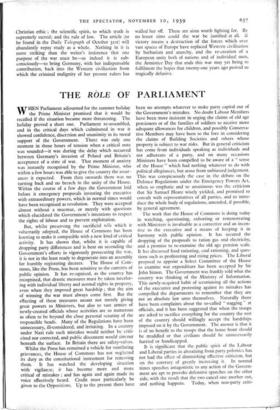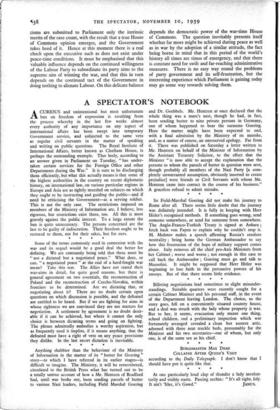THE ROLE OF PARLIAMENT
WHEN Parliament adjourned for the summer holiday the Prime Minister promised that it would be recalled if the situation became more threatening. The holiday proved a short one. Parliament re-assembled, and in the critical days which culminated in war it showed confidence, discretion and unanimity in its moral support of the Government. There was only one moment in those hours of tension when a critical note was sounded—it was during the delay which occurred between Germany's invasion of Poland and Britain's acceptance of a state of war. That moment of anxiety was instantly recognised by the Prime Minister, who within a tew hours was able to give the country the assur- ances it expected. From then onwards there was no turning back and no breach in the unity of the House. Within the course of a few days the Government laid before it emergency proposals investing the executive with extraordinary powers, which in normal times would have been recognised as revolution. They were accepted almost without a murmur, or merely with questions which elucidated the Government's intentions to respect the rights of labour and to prevent exploitation.
But, whilst preserving the sacrificial role which it voluntarily adopted, the House of Commons has been learning to make it compatible with a new kind of critical activity. It has shown that, whilst it is capable of dropping party differences and is bent on seconding the Government's efforts in vigorously prosecuting the war, it is not in the least ready to degenerate into an assembly for humbly registering decrees. The House of Com- mons, like the Press, has been sensitive to the currents of public opinion. It has recognised, as the country has recognised, that drastic measures must be taken interfer- ing with individual liberty and normal rights in property, even when they imposed great hardship ; that the aim of winning the war must always come first. But the effecting of these measures meant not merely giving great powers to Ministers, but also to vast armies of newly-created officials whose activities are so numerous as often to be beyond the close personal scrutiny of the responsible heads. Many of the Regulations have been unnecessary, ill-considered, and irritating. In a country under Nazi rule such mistakes would neither be criti- cized nor corrected, and public discontent would simmer beneath the surface. In Britain there are safety-valves.
Whilst the Press has remained a vehicle for ventilating grievances, the House of Commons has not neglected its duty as the constitutional instrument for removing them. It has watched the developing situation with vigilance; it has become more and more critical of mistakes ; and has again and again made its voice effectively heard. Credit must particularly be given to the Oppositions. Up to the present there have been no attempts whatever to make party capital out of the Government's mistakes. No doubt Labour Members have been more insistent in urging the claims of old age pensioners or of the families of soldiers to receive more adequate allowances for children, and possibly Conserva- tive Members may have been to the fore in considering the claims of Building Societies and others whose property is subject to war risks. But in general criticism has come from individuals speaking as individuals and not adherents of a party, and on many occasions Ministers have been compelled to be aware of a " sense of the House " which had nothing whatever to do with political allegiances, but arose from unbiassed judgement. This was conspicuously the case in the debate on the Defence Regulations under the Emergency Powers Act, when so emphatic and so unanimous was the criticism that Sir Samuel Hoare wisely yielded, and promised to consult with representatives of all parties, and to intro- duce the whole body of regulations, amended, if possible, by general agreement.
The work that the House of Commons is doing today in watching, questioning, exhorting or remonstrating with Ministers is invaluable as a corrective and an incen- tive to the executive and a means of keeping it in harmony with public opinion. It has secured the dropping of the proposals to ration gas and electricity, and a promise to re-examine the old age pension scale. It has discussed food rationing, coal rationing, and ques- tions such as profiteering and rising prices. The Liberal proposal to appoint a Select Committee of the House to examine war expenditure has been accepted by Sir John Simon. The Government was frankly told what the country was thinking of the Ministry of Information. This newly-acquired habit of scrutinising all the actions of the executive and protesting against its mistakes has compelled the departments to remember that they are not an absolute law unto themselves. Naturally there have been complaints about the so-called " nagging at officials, and it has been suggested that when the troops are asked to sacrifice everything for the country the rest of the country should willingly accept the hardships imposed on it by the Government. The answer is that it is. of no benefit to the troops that the home front should be muddled or that civilians should be unnecessarily harried or handicapped.
It is significant that the public spirit of the Labour and Liberal parties in abstaining from party polemics has not had the effect of diminishing effective criticism, but on the contrary of greatly increasing it. In normal times speeches antagonistic to any action of the Govern- ment are apt to provoke defensive speeches on the other side, with the result that the two cancel one another out, and nothing happens. Today, when non-party criti- cisms are submitted to Parliament only the intrinsic merits of the case count, with the result that a true House of Commons opinion emerges, and the Government takes heed of it. Hence at this moment there is a real check upon the executive such as does not exist under peace-time conditions. It must be emphasised that this valuable influence depends on the continued willingness of the Labour Party to subordinate its party aims to the supreme aim of winning the war, and that this in turn depends on the continued tact of the Government in doing nothing to alienate Labour. On this delicate balance depends the democratic power of the war-time House of Commons. The question inevitably presents itself whether far more might be achieved during peace as well as in war by the adoption of a similar attitude, the fact being borne in mind that in this period of the world's history all times are times of emergency, and that there is constant need for swift and far-reaching administrative measures. There is no easy way round the problems of party government and its self-frustration, but the interesting experience which Parliament is gaining today may go some way towards solving them.





































 Previous page
Previous page